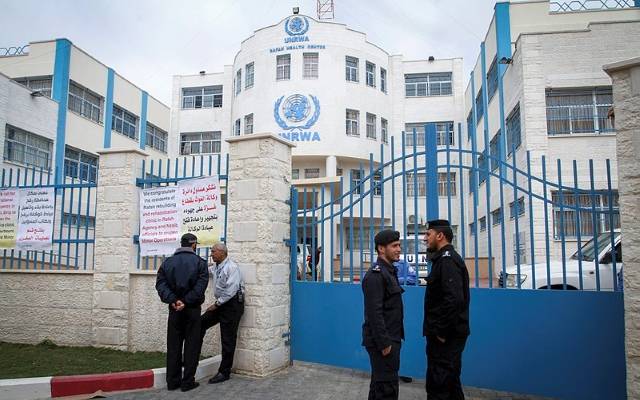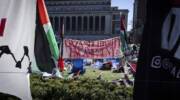UNRWA is not really a humanitarian organization; it is a political organization that employs emotive humanitarian issues to further its underlying political goal: the Palestinians’ so-called “Right of Return.”
By: Martin Sherman
The recent decision by the Trump administration to defund the United Nations Relief and Works Agency (UNRWA) was nothing less than a long overdue moral imperative.
In many ways, it was also a master-stroke of international diplomacy that exposed one of the most-long standing and mendacious myths that has, for decades, plagued the discourse on the Arab-Israeli conflict, in general and the Israeli-Palestinian one, in particular.
A Political Organization in Humanitarian Guise
UNRWA is not really a humanitarian organization. Rather, it is a political organization that employs emotive humanitarian issues to further its underlying political goal—preserving, perpetuating and promoting the so-called “Right of Return”.
Implementation of this “Right of Return” would mean that around five millions of Arabs, comprising mainly descendants of those who fled Israel seventy years ago, during its 1948 War of Independence, and who reside today in various countries around the globe but mainly in Jordan, Lebanon and Syria, would have the right to return to Israel. This would clearly inundate the country with a massive wave of hostile Arab “returnees”, effectively bringing about its demise as the as the nation-state of the Jewish people. This intent is clearly reflected in a 1961 interview with Gamal-Abdul Nasser who proclaimed “If the refugees return to Israel, Israel will cease to exist.”
The callous disregard for humanitarian considerations, sacrificed for cynical political goals are tellingly conveyed in a 1952 statement by Lt. Gen. Alexander Galloway, then director of UNRWA in Jordan: “It is perfectly clear that Arab nations do not want to solve the Arab refugee problem. They want to keep it as an open sore, as an affront against the United Nations and as a weapon against Israel. Arab leaders don’t give a damn whether the refugees live or die”.
Subordinating Humanitarian Plight to Political Objectives
The same enduring unfeeling indifference for the plight of their Palestinian “brethren” on the part of the wider Arab world was reflected in a 2004 LA Times interview with Hisham Youssef, then-spokesman for the 22-nation Arab League, who admitted that Palestinians live “in very bad conditions,” but maintained that the official policy on denying Palestinians citizenship in the counties of decades-long residence is meant “to preserve their Palestinian identity”.
According to Youssef: “If every Palestinian who sought refuge in a certain country was integrated and accommodated into that country, there won’t be any reason for them to return to Palestine”
The significance of this is clear.
The nations comprising the Arab League are prepared to subordinate the improvement of the dire humanitarian conditions of the Palestinians resident throughout the Arab world to the political goal of preserving the “Right of Return”—i.e. to using them as a pawn to effect the elimination of Israel as the nation-state of the Jews.
UNRWA vs UNHCR: A Tale of Two organizations
To begin to comprehend the egregious anomaly of UNRWA and its pernicious consequences, it is crucial to realize that all the refugees on the face of the globe are under the auspices of the UN High Commission for Refugees (UNHCR)—except for the Palestinians! They have a unique UN organization, UNRWA, exclusively devoted to dealing with them.
These two organizations have different definitions of who is a refugee and a different mandate for dealing with them—differences which have far-reaching political ramifications.
In very broad brush stokes, the differences and their significance can be summarizes as follows:
The UNRWA definition of a refugee includes any one “whose normal place of residence was Palestine during the period 1 June 1946 to 15 May 1948 [i.e. even transient laborers resident there for less than two years!-MS] and who lost both home and means of livelihood as a result of the 1948 conflict”— even if they have acquired citizenship and/or resident’s rights in another country—and extends to all their male descendants.
According to UNHCR a refugee is a person who “owing to well-founded fear of being persecuted for reasons of race, religion, nationality, membership of a particular social group or political opinion, is outside the country of his nationality and is unable or, owing to such fear, is unwilling to avail himself of the protection of that country.”
However, unlike with UNRWA, under the UNHCR refugee status does not extend to those who acquire citizenship/resident’s rights in other countries, or to migrants and is not transmitted automatically to descendants –although in certain circumstances it has been extended to later generations.
Moreover, according to UNHCR’s mandate, refugees under their auspices can be resettled permanently outside of their counties of origin—either in their country of refuge or in third party countries. According to the UNRWA mandate, it can only take care of the refugees’ humanitarian needs until they can return to their country of origin—i.e. present day Israel—but cannot resettle them permanently anywhere else. Indeed as a recent Foreign Policy article underscores: “UNRWA… is the only refugee agency in the world whose purpose is not to resettle refugees and help them go on with their lives.”
It should be clear that by its very definition of “refugee” employed by UNRWA, the number of refugees under its auspices will increase over time, while is inability to resettle them permanently ensures that nothing can be done to reduce that number.
Perpetuating the Problem Purported to Solve
Significantly, if the universal criteria for refugee status were applied to the Palestinian case, the numbers would shrink dramatically from over five million to around fifty thousand!
Clearly then, the combination of its definition specifying who is a refugee and its mandate specifying how to deal with them leads to the inescapable conclusion that UNRWA is in fact an organization that perpetuates—indeed, even magnifies—the very problem it was supposed to solve—i.e. the problem of the Palestinian refugees.
As such, it creates an insurmountable obstacle to any peace plan intended to resolve the conflict between Jew and Arab over control of the Holy Land.
For the ominous overhang of five million “refugees” artificially created by an anomalous definition and artificially nurtured by an anomalous mandate imperil the implementation of any formula proposed for peace—whatever one’s particular preference might be.
For an influx of millions into the territory west of the Jordan River will either hopelessly overwhelm and destabilize any putative Palestinian state established in the West Bank; or eliminate the Jewish majority within Israel, whatever it borders, and its ability to retain itself as the nation-state of the Jewish people.
Accordingly, however one might envisage the Israel-Palestinian conflict being resolved, it is imperative to eliminate UNRWA.
Martin Sherman is the founder and executive director of the Israel Institute for Strategic Studies.
Do You Love Israel? Make a Donation - Show Your Support!
Donate to vital charities that help protect Israeli citizens and inspire millions around the world to support Israel too!
Now more than ever, Israel needs your help to fight and win the war -- including on the battlefield of public opinion.
Antisemitism, anti-Israel bias and boycotts are out of control. Israel's enemies are inciting terror and violence against innocent Israelis and Jews around the world. Help us fight back!























